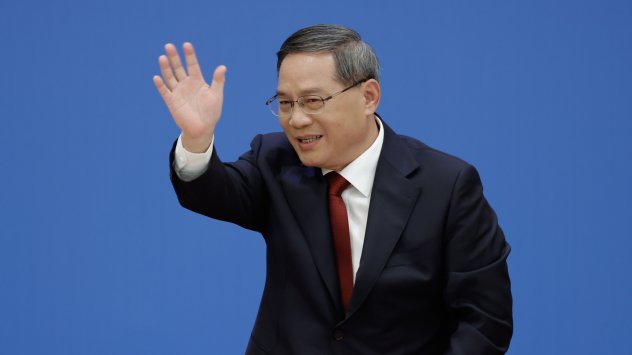
By Plamen Dimitrov
Last February, just 20 days before Russia's attack against Ukraine, Vladimir Putin was in Beijing and signed a joint statement with his host, Xi Jinping. It outlined the bright future of political, economic, and military cooperation between the two countries. Putin and Xi Jinping vowed no borders or no-go zones for friendship.
However, very soon, the friendship between Moscow and Beijing was put to the test. Putin threw himself into the military adventure in Ukraine, which bitterly pitted him against the West. The Chinese have not been warned about this sudden move by Moscow, although when he was in Beijing in February 2022, the Russian president already had a clear plan for the attack against Kyiv.
Officially, the Chinese position towards the Russo-Ukrainian war is neutral. In March 2022, when a resolution condemning Russian aggression was tabled in the UN General Assembly, Beijing voted "abstain." The same thing happened again on February 24 of this year, when a new resolution was voted on the first anniversary of the attack on Ukraine. But insofar as it is a war in which it is very clear who is the aggressor and who is the victim, China's neutrality means a favorable attitude towards Russia. With one clarification - Beijing always says it supports Ukraine's sovereignty and territorial integrity.
All this could be easily explained: the Chinese authorities want to regain control over the island of Taiwan with the argument that it is an integral part of the territory of China, that is, such an act would be the restoration of the territorial integrity of the Celestial Empire. At the same time, China shares almost the entire Russian propaganda narrative about the war in Ukraine – that NATO's aggressive eastward expansion triggered, that the West is adding fuel to the fire of the conflict by supplying arms to Kyiv, and so on. Anti-Western rhetoric is the factor uniting Moscow and Beijing. Regarding practical action, however, the Chinese maintain a line denoted by the obscure wording "strategic uncertainty."
The economy is the most obvious area of cooperation between Russia and China after February 24, 2022. The US, the EU, and their other allies have imposed sanctions on Moscow, the most serious of which are against exporting Russian energy resources – oil, oil products, and coal. The Russians gave up the European gas market on their own. Thus, energy-hungry China becomes the main hope that Russia will have a place to sell its coal, oil, and gas, which have become unnecessary in Europe. At the same time, a wide niche is opening up for Chinese manufacturers in the Russian market for household electronics and other industrial goods after the withdrawal of large Western companies from there.
What do the numbers tell us about this? In 2022 Russian-Chinese commodity exchange will reach $190 billion - a growth of 29% compared to the previous year. However, this represents only 3% of China's foreign trade volume. In terms of value, imports of Russian energy resources to China have increased significantly, mainly due to high international oil prices. Otherwise, in quantitative terms, the Chinese bought only 10% more Russian oil than the previous year. In the opposite direction of trade exchange - Chinese companies, for example, have captured 70% of the smartphone market in Russia after Western brands withdrew from the sanctioned aggressor state. So, under Western sanctions, Russia increasingly depends on trade with China.
Beijing is the only major economic window that remains open for Russian companies. In the early months of the war, Chinese business was staggered by the danger of falling under secondary American sanctions and slightly backed away from deals with Russia, but then things returned to normal.
But what worries the West most is the possibility that China will lend a hand to the Russian military industry or begin direct supplies of arms and ammunition to Moscow. Last month, during the Munich Security Conference, US Secretary of State Anthony Blinken warned CCP Central Committee Foreign Policy Officer Wang Yi that the consequences for Beijing would be severe if such a development were to occur. At the same time, official Washington claims that it has information about upcoming Chinese military support for Moscow. Indeed, this is precisely the red line the West marks out for Chinese policy regarding the Russian-Ukrainian war. Will Beijing be willing to cross it? So far, rather not, or it seems too unwise to do so. Possible Chinese arms deliveries to Russia would hardly remain hidden from American intelligence. Beijing's overt military aid to Russia would trigger economic sanctions against China. Even a partial shutdown of the US and EU markets for Chinese goods would be a disaster for the country known as the "workshop of the world."
China's progress and prosperity, which underpins its geopolitical ambitions, rest on international trade. In Beijing, they need to carefully consider whether they are ready to enter into a trade war with America, and perhaps also with Europe, to help Russia. If we compare China's rhetoric vis-à-vis America and vis-à-vis Europe, we will notice a nuance. Beijing often criticizes Western international aggressiveness but attributes it primarily to the US. Towards the Europeans, the tone is much more conciliatory, as demonstrated by Wang Yi in question in his speech at the Munich Security Conference. Moreover, Chinese diplomacy seeks to bet on bilateral relations with its biggest European trading partners, bypassing Brussels.
However, this is hardly possible, bearing in mind that in the EU, foreign trade is entirely under the authority of the European Commission and not of the individual member states of the Union. In other words, Beijing seeks to bring the geopolitical game surrounding the Russo-Ukrainian war into a quadrilateral involving China, Russia, the US, and Europe, instead of the current triangle in which Americans and Europeans are the same countries. This strategy is well known – the Kremlin has been trying to drive a wedge between the US and the EU for years. But right now, in the face of brutal aggression against Ukraine, Americans and Europeans are more united than ever.
The war in Ukraine has important implications for China's international ambitions. It somewhat postponed the bipolar moment in the global geopolitical balance. A year ago, the rivalry between the US and China was about to become a major axis of international politics, while now the West's efforts to curb Russian aggression in Europe have diverted attention from East Asia and its contender for world hegemony.
China aims to position itself as a constructive factor in resolving the Russian-Ukrainian conflict. On the day of the war's first anniversary, the Foreign Ministry in Beijing released a 12-point document titled "China's Position on Political Settlement of the Ukraine Crisis." It suggests opening peace talks (though never once using the word "war"), lifting "unilateral sanctions," easing the humanitarian crisis, etc. The document lays out some general foreign policy principles rather than offering a specific recipe for ending the war, which, in truth, there cannot be at the moment. President Biden has already criticized this document. The West generally does not evaluate it positively, but Beijing is aiming more at the so-called third powers, the countries of the "Global South," to perceive China as a constructive force.
After all, China is unlikely to go all the way in its support of Russia. Xi Jinping is confident he can outplay the Americans in the global geoeconomics and geopolitics chess game, albeit one played by Western-made rules. Therefore, the behavior of Putin, who kicked the board and moved the pieces, is not an example for Beijing to follow.
The Chinese are more patient, but we must keep one thing in mind for them too because Xi Jinping is increasingly turning into East Asia's Putin - an elderly authoritarian leader who has ruled his country unchecked for a long time.
THE BOTTOM LINE Beijing is perhaps the only major economic window that remains open for Russian companies.



